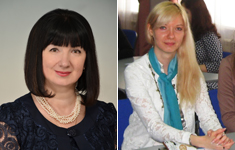Abstract
The article validates feasibility of the investigational research of the problem of formation of the future teachers’ professional competencies by means of a computer-based methodology; it determines the author’s approach to the interpretation of the essence of the computer-based methodology for the formation of professional competencies of the future teachers; it specifies the structural components of the computer-based methodology of formation of professional competencies of the future teachers: goals (objectives) of learning, content of learning, forms of educational process organisation, methods and tools of learning; it specifies the most effective traditional and computer-based forms, methods and tools of learning of Pedagogical disciplines for the students obtaining a Bachelor’s degree. This article discusses the interconnectedness of open source education and tools of the computer-based methodology for the formation of professional competencies of the future teachers; it reveals the structural components of professional competencies (subject-learned area, information and digital, communicative, personality, creativity) of the future teachers; works out the criteria (motivation-based and goal-setting, professional and cognitive, vocational and cognitive, reflexive and evaluational components), indicators, and levels (based on the analysis level, elementary (reproductive) level, creative (advanced) level) of formation of professional competencies of the future teachers in the settings of educational process at higher education institutions; highlights a complex of general scientific theoretical, empirical and statistical methods and consolidated results of a pedagogical investigation (analytics and search, experimental (ascertaining and formative) and bottom-line and correctional stages) on the study of the problem of the formation of professional competencies of the future teachers by means of the computer-based methodology in the settings of learning the disciplines of Pedagogy.References
V. І. Bobrytska, Educational policy of Ukraine in the field of informatization of education", Eucational Policy: Philosophy, Theory, Practice [Monograph], Kyiv, Ukraine: Publishing House for NPU named after M.P. Drahomanov, 2015, p. 273-316. (in Ukrainian)
ICT competency standards for teachers: competency standards modules. UNESCO" [Online]. Available at: http://cst.unesco-ci.org/sites/projects/cst/The%20Standards/ICT-CST-Competency%20Standards%20Modules.pdf. (in English)
V. І. Bobrytska, "Use of information and communication technologies in higher pedagogical education", Pedagogical Education : Theory and Practice. Pedagogy. Psychology, 2011, № 16 (2), p. 35-39. (in Ukrainian)
V. V. Yahupov, "Methodological requirements to the professional competence in professional education", Higher Education of Ukraine, Thematic issue «High School Pedagogy: Methodology, Theory, Technology», Kyiv-Yalta, Ukraine: 2013, № 3(50), Appendix 1, Volume 1, p. 82-85. (in Ukrainian)
А. М. Pyshkalo, "Methodical System of Teaching Geometry at Primary School»,the monograph-basedauthor's" report «Methodology of Teaching Geometry at Primary School» presented to obtain a Doctorate Degree, Moscow, Russia, 1975. (in Russian)
Yu. V. Trius, "Computer-based methodical systems of teaching mathematics disciplines at higher educational establishments: problems and prospects", Computer-based Systems of Teaching: Collection of Scientific Works, Editoril Board, Kyiv, Ukraine, 2007, NPU named after М. P. Drahomanov, Issue. 5, p. 3–14. (in Ukrainian)
V. І. Bobrytska, S. М. Protska, Computer-based education of the future philologists: [educational and methodical manual fo rstudents of HEI], Poltava, Ukraine: Skytech, 2016, 136 p. (in Ukrainian)
V. Yu. Bykov, Models of Organizational Systems of Open Education: Monograph, Kyiv, Ukraine: Atika, 2009, 684 p. (in Ukrainian)
V. І. Bobrytska, S. М. Protska, "Computer-based learning environmentas a means of forming professional competencies in the future teachers", Proceedings of the International Workshop" Cloud Technologies in Education" (20 December 2013) [Online]. Available at: http://tmn.ccjournals.eu/index.php/cte/2013(in Ukrainian)
V. І. Bobrytska, S. М. Protska, "Formation of the professional competencies in the future teachers of language and literature through the tools of the computer-based technologies", Information technologies and teaching tools, 2017, № 2 (58), p. 59-66, [Online]. Available at: http://journal.iitta.gov.ua/index.php/itlt/issue/view/87/showToc (in Ukrainian)
Derek Stockley, "e-Learning Definition and Explanation" [from Derek Stockley' human Resources Development], 2003, [Online]. Available at: http://www.derekstockley.com.au/elearning-definition.html (in English)
Authors who publish in this journal agree to the following terms:
- Authors hold copyright immediately after publication of their works and retain publishing rights without any restrictions.
- The copyright commencement date complies the publication date of the issue, where the article is included in.
Content Licensing
- Authors grant the journal a right of the first publication of the work under a Creative Commons Attribution-NonCommercial-ShareAlike 4.0 International License (CC BY-NC-SA 4.0) that allows others freely to read, download, copy and print submissions, search content and link to published articles, disseminate their full text and use them for any legitimate non-commercial purposes (i.e. educational or scientific) with the mandatory reference to the article’s authors and initial publication in this journal.
- Original published articles cannot be used by users (exept authors) for commercial purposes or distributed by third-party intermediary organizations for a fee.
Deposit Policy
- Authors are permitted and encouraged to post their work online (e.g., in institutional repositories or on their website) during the editorial process, as it can lead to productive exchanges, as well as earlier and greater citation of published work (see this journal’s registered deposit policy at Sherpa/Romeo directory).
- Authors are able to enter into separate, additional contractual arrangements for the non-exclusive distribution of the journal's published version of the work (e.g., post it to an institutional repository or publish it in a book), with an acknowledgement of its initial publication in this journal.
- Post-print (post-refereeing manuscript version) and publisher's PDF-version self-archiving is allowed.
- Archiving the pre-print (pre-refereeing manuscript version) not allowed.


